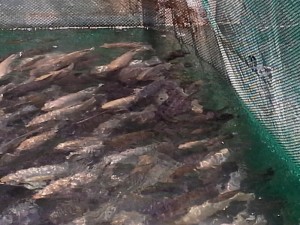
Fisheries officials who spoke at the 13th Meeting of the Caribbean Fisheries Forum, held in St. George’s, Grenada, earlier this week, highlighted the need for collective action by the 17 member states of the Caribbean Regional Fisheries Mechanism (CRFM), in order to overcome the mounting challenges which confront the fisheries and aquaculture sector of the Caribbean.
Senator Simon Steele, Parliamentary Secretary in the Ministry of Agriculture, Lands, Forestry, Fisheries and the Environment of Grenada, the keynote speaker for the event, elaborated on some of the challenges: among them international and local economic pressures and rising input costs; threats to fish stocks and habitats from pollution and illegal, unregulated and unreported fishing; as well as the adverse effects of climate change.
“We have no shortage of challenges,” said Steele, adding that, “To confront these challenges as small island developing states with vulnerable economies, it is of critical importance that we strengthen our cooperation and unity within the region, since we share common principles in developing, managing, and utilizing the living marine resources in a responsible and sustainable manner – which is why forums such as this are of such importance to us.”
Milton Haughton, the Executive Director of the CRFM, highlighted the need for the region to make a more concerted effort to reverse the trend of declining aquaculture in the Caribbean—a trend which runs contrary to the global upswing, which shows aquaculture outpacing capture fisheries.
“In the 1970s, most of the seafood we consumed was harvested from wild marine stocks with aquaculture contributing just 3% of total fish production. Today, aquaculture is the fastest growing food production sector in the world,” Haughton said.
By contrast he noted that, “Commercial aquaculture began in the region in the late 1970s and production steadily grew to just under 19,000 metric tons in 2004/2005. But since the global economic crisis, aquaculture has declined dramatically in the region to about 8,000 metric tons in 2012, with the main reduction coming from the collapse of the industry in Jamaica, which fell from 5,000 to 6,000 metric tons to just about 500 metric tons in 2012.”
Haughton said that the Caribbean must begin to put in place the systems and regulations needed to overcome the impediments being faced in the region.
“We do need to provide the necessary legislative and regulatory framework, the policy support and the incentives to our fish farmers and private sector investors, so that they can grow the sector and increase production not only for local consumption but also for exports, to earn foreign exchange, to generate employment opportunities, and to create wealth for our people,” the CRFM Executive Director urged.
During the past year, the CRFM, with funding from the Technical Centre for Agricultural and Rural Cooperation (CTA), conducted a review of aquaculture in region and it prepared a 5-year plan of action to guide development of aquaculture for the coming years.
“Our region is endowed with a vast amount of marine space which provides significant opportunities that can contribute to the economic and social development of current and future generations. It is fundamental that we engage in efforts that would enhance capacity and collaboration among our peoples at all levels,” said Marilyn Austin-Cadore, Permanent Secretary in the Ministry of Forestry and Fisheries, who noted that this was the first time the Forum was meeting in Grenada.

The caribean problem is we still think like peasant farmers
Tell Skerrit that. He rather travels half way around the world to sell Dominican passports in order to get some money. However, even that does not mean that the country as a whole will benefit from the proceeds. I suspect it won’t go any further than him an his cabal.
that not for dominica, is passport we selling and Chinese we want to out populate us, so please we are not interested in agricultural busnesses
Mr.Steele, I echo that same sentiment, but this will be increasingly difficult because your OECS chairman has vowed to give up or abandoned agriculture.
Dominica has been pushed 15 years backwards in Aquaculture because of Labour policies.